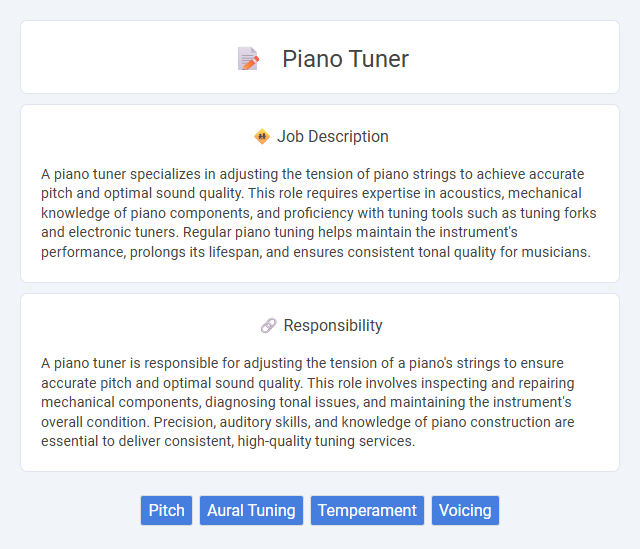
A piano tuner specializes in adjusting the tension of piano strings to achieve accurate pitch and optimal sound quality. This role requires expertise in acoustics, mechanical knowledge of piano components, and proficiency with tuning tools such as tuning forks and electronic tuners. Regular piano tuning helps maintain the instrument's performance, prolongs its lifespan, and ensures consistent tonal quality for musicians.
Individuals with a strong auditory sensitivity and patience might be well-suited for a piano tuner job, as it requires careful listening and meticulous adjustments to achieve precise sound quality. Those who may struggle with fine motor skills or have limited attention to detail could find this profession challenging. The likelihood of success in this field seems higher for people who enjoy working independently and have a passion for music and acoustics.
Qualification
A piano tuner must possess a thorough understanding of piano mechanics, acoustics, and tuning theory, typically achieved through formal training or apprenticeship. Certification from recognized organizations like the Piano Technicians Guild enhances credibility and demonstrates advanced skill levels. Precision, keen auditory ability, and experience with various piano brands are essential qualifications for delivering high-quality tuning services.
Responsibility
A piano tuner is responsible for adjusting the tension of a piano's strings to ensure accurate pitch and optimal sound quality. This role involves inspecting and repairing mechanical components, diagnosing tonal issues, and maintaining the instrument's overall condition. Precision, auditory skills, and knowledge of piano construction are essential to deliver consistent, high-quality tuning services.
Benefit
A career as a piano tuner likely offers the benefit of steady demand, as both professional musicians and enthusiasts require regular maintenance to keep their instruments in optimal condition. This job probably provides flexible work hours, allowing tuners to manage their schedules and potentially balance multiple clients or projects. The role may also deliver personal satisfaction from combining technical skill with a passion for music, contributing to the instrument's tonal excellence.
Challenge
Piano tuning likely presents significant challenges due to the delicate balance required between technical skill and auditory precision. The probability of encountering complex issues with aging instruments means a tuner must continuously refine their expertise and adapt to various piano conditions. Mastery often depends on patience and a keen ear to detect subtle discrepancies in pitch.
Career Advancement
A piano tuner can advance their career by gaining certifications from organizations like the Piano Technicians Guild, which enhances credibility and opens opportunities for higher-profile clients and specialized tuning work. Building expertise in piano repair and restoration, alongside tuning, allows for diversification of services and increased income potential. Networking with music schools, concert halls, and professional musicians further supports career growth and access to prestigious projects.
Key Terms
Pitch
A piano tuner ensures each string produces the correct pitch by adjusting string tension precisely, maintaining the instrument's harmonic balance. Mastery of auditory skills allows identification of subtle pitch deviations, ensuring optimal sound quality and performance longevity. Regular tuning compensates for environmental changes that affect pitch stability, preserving the piano's tonal accuracy.
Aural Tuning
Aural tuning is a critical skill for piano tuners, requiring acute auditory perception to adjust string tension by ear rather than electronic devices. This method ensures the piano's sound quality is harmonically rich and tailored to the specific acoustic environment. Mastery of aural tuning involves recognizing subtle pitch variations and harmonics to achieve optimal tonal balance and intonation.
Temperament
A piano tuner specializing in temperament carefully adjusts the instrument's tuning to achieve a balanced sound across all keys, often using systems like equal temperament or meantone temperament. Mastery of temperament ensures the piano produces harmonious intervals and stable chords, essential for diverse musical styles and performance settings. Precision in temperament tuning enhances the instrument's sonic character and maintains its musical integrity over time.
Voicing
Voicing is a crucial aspect of piano tuning that involves adjusting the hardness of the hammers to achieve a balanced tonal quality across all notes. Piano tuners use specialized tools like voicing needles to soften or harden hammers, ensuring consistent sound dynamics and timbre. Mastery in voicing enhances the instrument's expressiveness and overall musicality, making it essential for professional piano tuning services.
 kuljobs.com
kuljobs.com